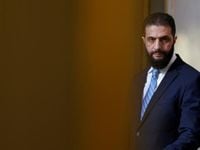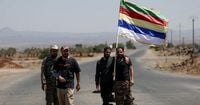Syria is gearing up for a pivotal parliamentary election scheduled between September 15 and 20, 2025, marking the first such vote since the dramatic fall of former President Bashar al-Assad in December 2024. This electoral milestone, announced by Mohammed Taha al-Ahmad, chairman of the Higher Committee for People’s Assembly Elections, signals a crucial step in the country's ongoing political transition under new leadership.
The election will establish a new 210-seat parliament, with two-thirds of the members—140 seats—chosen by local electoral bodies and the remaining 70 appointed directly by interim President Ahmed al-Sharaa. This structure stems from a temporary constitutional declaration adopted in March 2025, which sets a five-year transition period during which this interim parliament will exercise legislative powers until a permanent constitution is ratified and fresh elections held.
President Ahmed al-Sharaa, who came to power after leading a rebel coalition that overthrew Assad's regime, has emphasized the importance of holding elections across all Syrian governorates to foster national unity. He has explicitly rejected any form of division, stating that individuals who sided with criminals or advocate for sectarianism and factionalism will be barred from participating in the vote.
The electoral process is being closely managed by a 10-member committee established by presidential decree in June 2025. Mohammed Taha al-Ahmad leads this committee, which has been tasked with forming local electoral bodies across Syria’s provinces. These bodies will oversee candidate selection, with candidacies opening for about a week before public debates take place. Ahmad has pledged that women will be represented in the new parliament, an important note in a country grappling with political and social upheaval.
However, the election comes at a time when Syria remains deeply fractured. Earlier in July 2025, sectarian violence erupted in the southern province of Suwayda, resulting in hundreds of deaths and threatening to destabilize the fragile postwar transition. The clashes began around mid-July, sparked by tit-for-tat kidnappings between armed Bedouin clans and fighters from the Druze religious minority. Syrian government forces intervened, reportedly siding with the Bedouin clans. This intervention led to further atrocities, including alleged executions of Druze civilians and the burning and looting of homes.
Adding to the complexity, Israel launched air strikes on Syrian government forces and the Defence Ministry headquarters, citing the defense of the Druze minority as justification. These developments have intensified concerns about the new authorities' ability to maintain stability and protect minority groups within the country.
Critics of the temporary constitutional declaration warn that it consolidates power within President al-Sharaa’s hands and fails to adequately represent Syria’s diverse ethnic and religious communities. The decision to increase parliamentary seats from 150 to 210, with a significant portion appointed by the president, has drawn scrutiny, especially following al-Sharaa’s controversial appointments of his brothers, Maher and Hazem, to senior government positions.
Randa Slim, a non-resident senior fellow at the SAIS Foreign Policy Institute, expressed cautious optimism about the process but also skepticism regarding its fairness. She told The National, “It’s a good step and starting to bring more people into the circle of decision-making. Whether it’s going to be a fair representation of the wide variety of opinions that are represented in the Syrian electorate is a different thing.” Slim highlighted concerns about candidate screening controlled by al-Sharaa and Foreign Minister Asaad Shibani, which could reinforce the president’s hold on power.
Meanwhile, a Syrian investigative committee revealed on July 22, 2025, that it had identified 298 suspects involved in serious violations during sectarian violence in the Alawite heartland earlier in the year. That bloodshed resulted in the deaths of at least 1,426 members of the Alawite religious minority. These findings, coupled with the recent violence in Suwayda, underscore the ongoing challenges facing the new government in managing sectarian tensions and delivering security to all Syrians.
International observers and independent election monitors are expected to be invited to oversee the September polls, a move aimed at lending credibility to the process. However, the deeply polarized political landscape and the legacy of over a decade of civil war mean that the elections will be closely scrutinized both inside and outside Syria.
The parliamentary mandate will last 36 months and is renewable, as outlined in the constitutional declaration. The assembly’s role is critical for Syria’s transition, tasked with legislative duties until a permanent constitution is adopted. Yet, questions remain about whether this transitional parliament can truly represent the country’s mosaic of communities and help heal the divisions wrought by years of conflict.
As Syria approaches these landmark elections, the nation stands at a crossroads. The political future hinges on whether new institutions can foster genuine inclusivity and stability, or whether entrenched power dynamics and sectarian strife will continue to undermine hopes for lasting peace.


